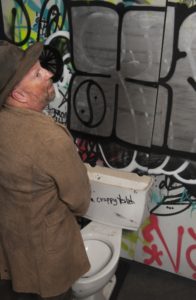Urinetown director Roger Carr likes his plays the same way he likes a frosty pint: the darker the better. Why, then, is the local director working on a musical/satirical comedy if he likes dark plays? Because there’s more bubbling under Urinetown’s surface than there initially seems to be.
“This musical raeally appeals to me,” he says, “and has story in it, and has some political satire talking about a post-apocalyptic society.”
Carr says the inception of the play goes back to when the writer, Greg Kotis, realized he had not budgeted for the use of public restrooms during a backpacking vacation in Europe. Yes, that’s right: budgeted for the use of public restrooms.
“You had to pay to pee,” says Carr. “I thought that was a very innovative and novel way to come to a concept for a play, but I also like what they did, which is they took the concept of he or she who controls the power of urinals controls ultimate power.”

Carr understands if people are hesitant to see the play due to its title, but he says that audiences should move past judgements like that.
“I do appreciate the fact that there may be some younger couples that will go, ‘I don’t want to see a play about urine,’” he says.
But the play is most definitely not about pee, says Carr.
“It’s a play about power,” he says, “and a play about rebellion, revolution, all of those elements.”
Carr says it can be more challenging to direct a comedy than a drama: as always, the director needs to remain aware of characters’ motivations while keeping in mind blocking and other elements of theatre, but there is the additional responsibility of throwing comedic timing into the mix.
“There’s multi-layers to playing a comedy which you don’t always get when you’re doing a drama,” he says.
Carr’s job comes down to looking deep into the characters’ motivation and making some technical adjustments to the actors’ and actresses’ processes during rehearsal.
“At every rehearsal, characters are saying, ‘Why am I doing this?’ That’s always the basic question for an actor: ‘Why are you doing this?’ They ask the same questions. I have to answer those questions,” says Carr. “But at the same time, I will say to them, ‘Okay, what I want you do at this moment is put a big pause there, look in this direction there, or just do this one directly at the audience,’ because those are stylistic cues, and those come with the territory of either comedy or this particular satirical style of play.”
The characters sometimes narrate to the audience, which poses unique directorial challenges for Carr in terms of comedic timing.
“The actors of the play frequently stand aside from the plot and they become very much representational,” he says. “They’re deliberately being evocative and provocative.”
Carr says that any satire that currently deals with political power nods to Donald Trump.
“We’re living in a world in which abuse of power is rampant,” says Carr, “and this is a play about the abuse of power.”
And satire itself is a powerful medium, says Carr. He says there is a joy in doing satire that goes beyond other forms of theatre.
“Anyone can stand on stage and do a pretty dance or sing a pretty song,” he says, “but if you’ve got something with some balls in it—and this one really does— it’s great.”
Urinetown
Various times, Wednesday, January 17 to Saturday, February 3
Various prices, Langham Court Theatre
langhamtheatre.ca
